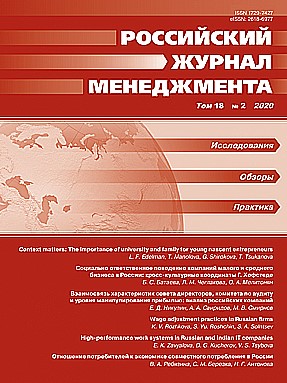Consumer’s Attitude to the Sharing Economy in Russia
DOI:
https://doi.org/10.21638/spbu18.2020.206Abstract
This research is focused on the main characteristics of sharing economy as one of the fast-developing sectors of 4.0 industry in the world and in Russia. Due to the increasing role of a consumer as one of the key economic agents in the sharing economy, the research is focused on the sharing economy adoption factors on the consumer level. Sharing economy development perspectives and adoption factors, including drivers and impediments the consumers are facing are analyzed in the paper. To identify the factors determining the consumer behavior in the sharing economy in Russia, the quantitative survey with 2576 respondents was conducted. The analysis of empirical data allows to reveal six main factors of sharing economy developing from the consumer perspective: (1) the attitude to the sharing economy, (2) difficulties to start participation in the sharing economy, (3) perceived risks, (4) the role of property, (5) influence of the referent groups, (6) hygienic factors of sharing economy. After the cluster analysis, three consumer clusters were determined: (1) consumers with neutral attitude to the sharing economy, (2) skeptical consumers, (3) competent consumers. The results of the analysis are relevant both for the academic research and for the management practice and allow to make conclusions on the problems and perspectives of the sharing economy development in Russia based on the analysis of the impediments and stimulating development factors (drivers) in the context of the behavioral model of Russian consumers in the sharing economy.
Keywords:
Sharing economy, 4.0 industry, digital transformation, consumer attitude
Downloads
References
REFERENCES IN LATIN ALPHABET
Translation of references in Russian into English
Downloads
Published
How to Cite
Issue
Section
License
Articles of the Russian Management Journal are open access distributed under the terms of the License Agreement with Saint Petersburg State University, which permits to the authors unrestricted distribution and self-archiving free of charge.





